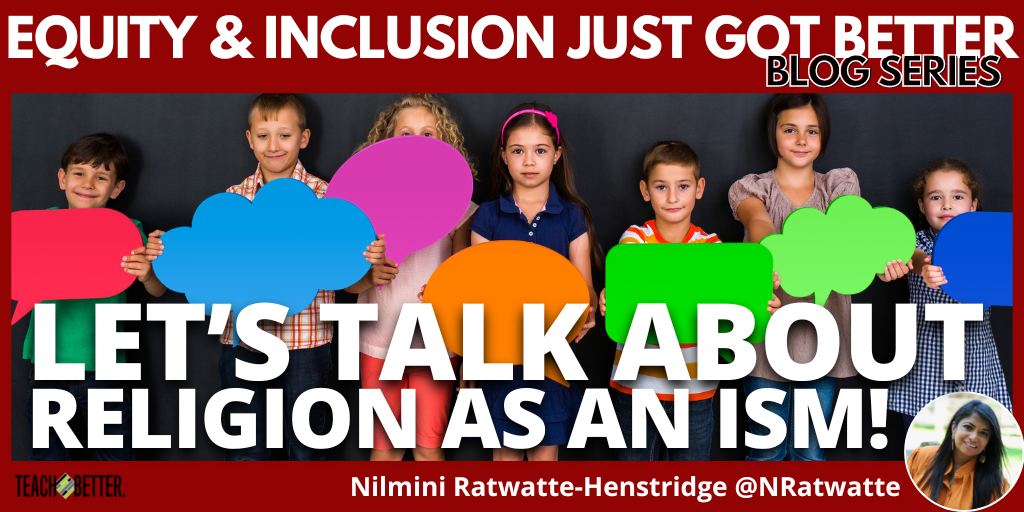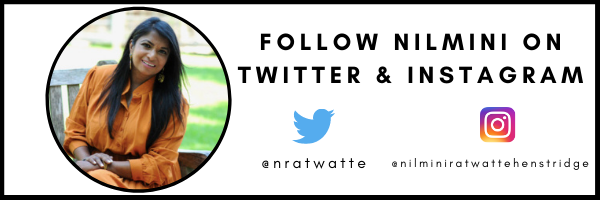TL;DR:
- Individuals all have their own religious or faith-based practices they bring into the classroom.
- Take the time to learn about all the different beliefs and holidays.
- Reevaluate the options you are giving to students and staff.
- Make everyone feel welcome.
I was taught by my father, my Thathi who said never ever to discuss this topic since it’s political. My Ammi, my mom would agree I think, and so would my Mali, my little brother. So I am not going to talk about religion. Instead, I’m giving you some insights into how it applies to daily classroom programming.
Question the current practices in schools, always knowing there are accommodations that can be set up for all to be more inclusive in our practice. Click To TweetBut for our educational reflection this month, we are discussing religion as an ism. First, know that your back is going to get up and that you are going to be defensive. Take a breather to reflect on the questions first. Then be a reflective practitioner as you read through the blog to understand bias and how it can be present in religion and beliefs associated with specific traditions and celebrations.
Equity and Inclusion Reflection Questions:
- What is the most prevalent religion that is accepted around the world?
- Do you belong to a religion or a faith group or do you not?
- What are some points of view that you hold against other religions in the world?
A great starting point: a story for you to reflect upon as you read…
I love this clip from Sri Lanka, the ancient historic country that currently holds many religions of the world in their integrated society of cultural fusions and religious affiliations which are very strong in the hearts of citizens. If you ever get to go visit the historic country, you will find many traditions based on Buddhism that have been integrated into cultural values and practices.
My mother was born in the city of Colombo and it is a part of my family heritage. It has a history dating back to Catholic Religion as it arrives on the island of Ceylon which it was called prior to Independence as Sri Lanka.
My father was born in Kandy and is a part of my family heritage. With a historic significance that dates back to 305-331 A.D., the Esala Perahera is a religious and cultural pageant that is the biggest Buddhist and cultural festival in Sri Lanka!
Scientific evidence of the connections I found in this clip you may find phenomenal. If you are an individual who needs evidence, this is pretty amazing to show how the two countries, India and Sri Lanka, and their historic pasts are connected.
Perehera from the Sri Dhalada Maligawa: If you ever get to watch this tradition in real life that brings together the people of the mountain region of the country you will be fascinated and will have a lot of questions as well. That will help you connect to the historic period in world history of the days of Lord Buddha and his followers and the guidance provided to living in peace.
If the World Were a Village of 100: Individuals enhance your perspective on world religions. Think about how we as teachers, as educators, can adapt this concept to welcome all religious celebrations of our students and families into our classrooms and into our schools to welcome community members. A quote from the book: “33 villages would be Christians, 20 would be Muslims, 13 Hindu, 6 Buddhist…etc.”

Question Current Practices
Question the current practices in schools, always knowing there are accommodations that can be set up for all to be more inclusive in our practice. As this month comes to an end, reflect on Halloween as a celebration.
1. Modify classroom programming and provide accommodations.
It’s very important to make a note to yourself to know that you are going to make mistakes. And you will have to modify and adjust accordingly. Dive deeper into accommodations and modifications by reflecting on your practice.
October 31st is Halloween. This is the example that I am going to use to teach you that not every religion believes it is ok to celebrate Halloween. Consider modifying your program to allow for students not to participate or participate in their capacity on how they are comfortable to make a contribution. This allows them to feel welcomed into the celebration and not feel left out.
2. Give choice so students and staff in schools have options.
Choices open up many doors so that you can see how effective the accommodations you set up are.
On October 31st, give a choice to join in with treats or without treats. Give a choice to join in dressing up in a role with a costume, or with black and orange clothing. Or give the choice to be an observer and not participate and present why they do not believe in Halloween or Trick or Treating. These differences make us valuable participants in the global community and understanding how mainstream celebrations can be viewed in different ways.
3. Give voice to the students and staff.
Ask: “Can you do this in your culture, why and why not?”
[scroll down to keep reading]Take Action
On October 31st, provide tasks to bring students together by emphasizing their voice so that they can learn and ask questions. Pumpkin Carving. Apple Bobbing. Trick or Treating. Research the historic point of view. Make the celebration unified by having the question seekers participate by researching while students who do participate teach others about the events surrounding Halloween.
If you celebrate Halloween in your communities, Happy Halloween. And if you don’t, research more about what happens during this celebration. My favourite part is going to the pumpkin patch. Seeing the Halloween decorations in my neighbourhood on walks. Exploring and learning about the traditions that surrounded the seasonal changes during this season as I make plans for the changing colours of autumn…
Yours in Education,
Nilmini
About Nilmini Ratwatte-Henstridge
Nilmini Ratwatte-Henstridge teaches in Brampton, Ontario, Canada. She was born in Sri Lanka and immigrated to Canada with her family. As an elementary school teacher who is passionate about equity, social justice, and human rights in education, she enjoys teaching the younger generation to be global-minded citizens.
Discovering the world by connecting with others is an opportunity that we have today in our society today and she loves meeting new people! She is always learning while traveling to understand the inter-connectedness of this beautiful earth we live in! Nilmini LOVES cooking great meals, watching movies, and the latest fashion trends! Family and friends are close to her heart as she looks forward to balancing social media and navigating professional learning communities in education to network globally this year!





